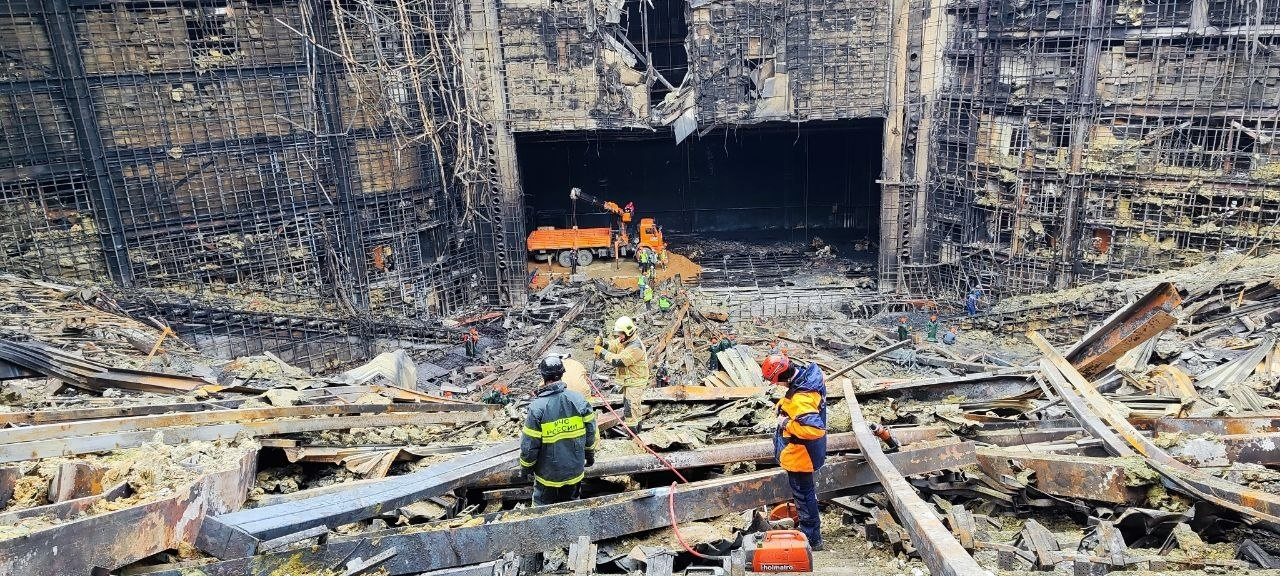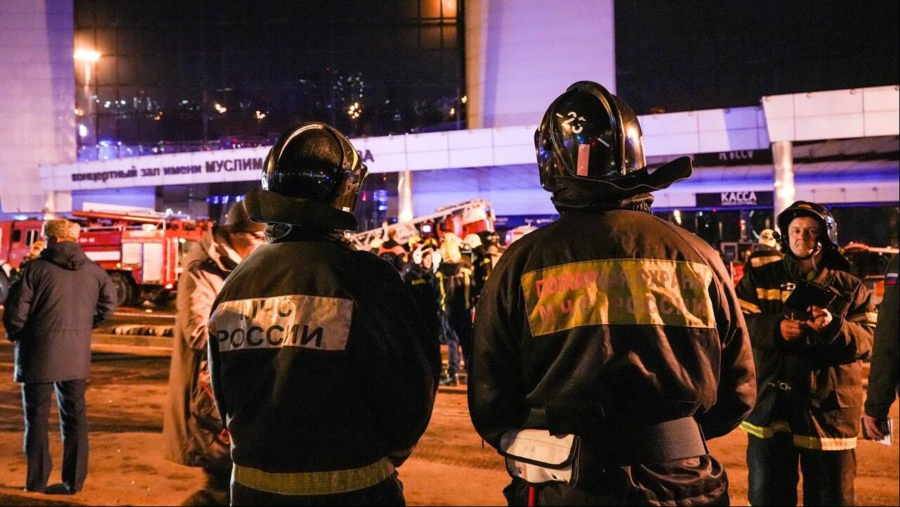After a heinous terrorist attack in the Moscow metropolitan area, Russian security forces arrested 11 people, seven of whom are ethnically Tajik, sparking a backlash against the Central Asian migrant population in Russia. Human rights organizations said they received thousands of alerts of threats or violence against Central Asians residing in Russia.
Experts say that while radicalization mostly happens abroad, the amount of people that terrorist organizations manage to attract from labor migrants is small.
Читайте этот материал на русском.
The Crocus Attack
On the evening of March 22, in the Crocus City concert hall in the Moscow region, a handful of militants carried out a terrorist attack, killing at least 144 people and injuring around 550. According to Russian authorities, when the security forces arrived, the militants had already managed to escape.
A few people later detained in the Bryansk region, near the border with Belarus and Ukraine, were identified as part of the group that carried out the attack.
The Russian media first alleged that the group came from Ingushetia, a region in the North Caucasus, and then pointed to migrants from Tajikistan. The mugshots that circulated online after the attack were soon dismissed by Tajikistan’s ministry of foreign affairs, which said those citizens were living in Tajikistan at the time.
Russian security forces published videos that displayed of torture and violence against detainees. Among the detainees, four people were indicated as Tajik nationals. Footage from the courtroom showed them with bruises and bandages covering signs of torture. One of them had their ear cut off during detention. Another was in a state of shock and could not walk or open his eyes. Shamsidin Fariduni, another detainee was electrocuted after having confessed to the camera that he had carried out the attack for 500,000 rubles. Three other people from Tajikistan and one from Kyrgyzstan were later arrested in connection with the attack.
While the Islamic State - Khorasan Province claimed responsibility for the attack, some Russian officials, including President Vladimir Putin, pointed to Ukraine, alleging that the Kyiv government was going to help the attackers find shelter had they managed to flee Russia.
Deputies in the Duma, Russia’s parliament, called for the establishment of a visa regime for all Tajik citizens and for sentencing the alleged perpetrators of the attack with the death penalty.
What is ISIS-K?
Known in short as ISIS-K (or ISIL-KP, or ISKP), the Islamic State - Khorasan Province is a terrorist group formed in 2014-2015 and based mostly in Afghanistan.
Edward Lemon, a professor focusing on Tajikistan at Texas A&M University, said the group draws heavily from Central Asian residents in its recruiting tactics.
“ISIS-K first emerged in 2014 as an offshoot of ISIS in Syria. Its goal is to establish a branch of the ‘caliphate’ in India, Pakistan, Afghanistan, and Central Asia. It has mostly based itself in Afghanistan, where it has fought the Taliban. It has numerous Central Asians in its ranks and has made efforts to target them online, particularly Tajiks,” Lemon told Vlast.
ISIS-K had carried out several attacks before the Crocus mass shooting, the latest of which in Turkey in January 2024. During Sunday prayers at St. Mary's Catholic Church in Istanbul, two gunmen opened fire on the congregation, killing one person. The shooters were identified as Amirjon Kholikov from Tajikistan and David Tanduyev from Russia.
Harold Chambers, analyst on conflict, nationalism, and security in the North Caucasus, and a PhD candidate at Indiana University, said ISIS-K has planned several attacks in recent years.
“Attacks across Europe and Eurasia have been stopped, sadly not all, and ISIS-K has indicated it wants to begin attacking China and to conduct a 9/11-style attack on the United States,” Chambers told Vlast.
Both Chambers and Lemon noted that “ISIS-K has also stated it intends to carry out attacks in Central Asia.”
According to Chambers, Russia became a target for its support of the Taliban regime in Afghanistan, the poor treatment of its Muslim minorities, and its role in the military operations in Syria.
Targeting Migrants
For Tajiks, radicalization mostly happens abroad, because of the large portion of labor migration, Lemon argued.
“More Tajiks are being recruited in migration than at home. This is in some ways natural, given that around 2 million citizens, or over half of working age men are in migration,” Lemon said.
The process of migration, according to him, plays a role.
“First, migrants in Russia suffer terrible conditions, generating grievances against the host country and making the offer of an alternative life through terrorist groups more appealing. Second, migrants often lose ties to their family and friends, often experiencing crises that make them vulnerable to recruitment. Finally, there are more established networks of recruiters in migration,” Lemon said.
Chambers agreed, pointing to the weak position in which migrant workers find themselves.
“Being a labor migrant generally carries with it stigmatization, stark living conditions, and greater systemic vulnerability. These conditions are particularly felt by Central Asians in Russia,” Chambers said.
According to Temur Umarov, an analyst at the Carnegie Endowment, by producing content in Cyrillic Tajik, ISIS-affiliated media specifically target Tajiks. ISIS-K has also published content that criticizes Tajikistan’s President Emomali Rahmon for his close ties to Russia.
However, the experts note that only a very small minority of the migrant population becomes radicalized and joins terrorist organizations.
“From their perspective, [terrorist organizations] only need a low recruitment success rate to have a potentially high success rate operationally,” Chambers said.
Xenophobia Against Migrants
The attack at Crocus led to the spreading of xenophobic views across social networks, demanding the deportation of migrant workers and tougher migration laws for immigrants from Central Asia.
Vladislav Davankov, the vice-speaker of the Duma and a presidential candidate earlier in March, said that migrants should be “deported for the slightest offense”. Other deputies called for the introduction of a visa regime with Tajikistan.
Taxi drivers lamented that customers were racially profiling them before accepting a ride, discriminating against Tajik drivers. One of the taxi drivers told the Russian outlet Novaya Gazeta that he was afraid to go out in the evening because of potential xenophobic attacks.
The night after the attack at Crocus, a group of people set on fire a market stall run by shopkeepers from Tajikistan in Blagoveshchensk, in Russia’s Far East.
The victims of the attacks often refrain from going to the police for fear of further retaliation.
“We are the least protected. I didn’t even go to the police because I was scared. They beat me in the open and this hurts and humiliates me. But the police can put me in jail,” a man told Novaya Gazeta.
Valentina Chupik, a lawyer, said that migrant workers became the target of a new wave of violence after the terrorist attack.
Her office received more than 4,000 requests for legal help in the five days following the attack. While the average used to be around 170/day, it grew after the attack, reaching 1,431 on March 24 alone.
In the week following the attack, an “anti-migrant operation” started in St. Petersburg, featuring law enforcement officials picking up migrant workers from Central Asia from the streets and sending them to deportation centers. In the first week since the attack, around 400 migrants were sentenced to be deported.
In an interview with Vlast, Umarov said that the terrorist attack opens the way to even greater discrimination against people from Central Asia in Russia.
“A new wave of influencers that emerged in the wake of the war in Ukraine helped spread anti-migrant statements. Their rhetoric is not contained in any way, partly because the Russian government is flirting with groups that support the war in Ukraine,” Umarov said.
Labor migration, however, cannot be stopped, because the war in Ukraine exacerbated a long-standing labor shortage in Russia. According to official statistics, in 2023 Russia faced a deficit of 4.8 million working people.
“The condition of migrants will surely worsen. The fact that citizens of Tajikistan were detained on suspicion of a terrorist attack will be a good argument for Russian security forces to tighten the screws on the migrant population,” Umarov argued.
President Rahmon immediately condemned the terrorist act and said that “terrorists have no nationality, no family, no religion.” Yet, there was no official reaction either to the torture of alleged militants or to the mass searches and detentions of migrant workers from Tajikistan.
Nine people were arrested in Tajikistan in connection with the terrorist attack in Russia. According to Tajik media outlet Asia-Plus, another 15 were later arrested in connection with a failed attack in Vahdat, a city in western Tajikistan.
The Tajik embassy in Russia advised its citizens to refrain from participating in mass gatherings. Following this, the embassies of Uzbekistan and Kyrgyzstan also sent out warnings.
“Rahmon’s political regime is primarily concerned with maintaining stability. For this, relations with Moscow are important. [His reaction] was a clear signal to Putin: ‘do whatever you want with them, they are not our citizens, forget about their passports and we have nothing to do with them.’ The same will happen to everyone who falls under the comb of the Russian security forces,” Umarov said.
Поддержите журналистику, которой доверяют.











